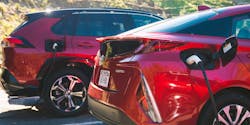After previously announcing its intention to build an electric vehicle battery plant somewhere in the United States, Toyota Motors North America revealed Monday the new $1.29 billion factory would be built in Liberty, North Carolina, about 70 miles from Raleigh. The battery plant will start production in 2025, Toyota says, and make enough batteries for about 1.2 million vehicles a year while employing roughly 1,750 people.
According to Toyota Motors North America, the factory—Toyota Battery Manufacturing, North Carolina, or TBMNC for short—will start operations with four production lines with the intention to eventually expand to six. The $1.29 billion for TBMNC will come out of the $3.4 billion Toyota announced it would spend on electrification earlier this year.
The six-line plant will be able to produce enough batteries for 1.2 million vehicles a year, Toyota said, but did not specify if the vehicles in question would be hybrid or fully electric. Unlike other automakers, Toyota has been reluctant to shift production to fully battery-powered vehicles in favor of the gasoline-battery hybrid vehicles it pioneered. Hybrid vehicles require fewer batteries than those powered only by batteries.
The new factory will technically be run by a new subsidiary company with the same name as the plant, Toyota Battery Manufacturing, North Carolina. Toyota Corp. will control 90% of the new company while Toyota Tsusho, a Toyota supplier, will control the rest.
In a statement, Toyota Motors North America CEO Ted Ogawa said the factory is in “the ideal location” to realize “the future of mobility,” electrification.
“North Carolina offers the right conditions for this investment, including the infrastructure, high-quality education system, access to a diverse and skilled workforce, and a welcoming environment for doing business,” Ogawa said.
Local infrastructure available in the area includes access to rail and highway systems, four international airports and two seaports, Toyota noted. The company is also receiving incentives from the state and local governments: According to the Associated Press, the company could receive more than $430 million in tax and cash breaks if it meets hiring and investment goals.
In a statement, North Carolina Gov. Roy Cooper said his state is “working hard every day toward a clean energy future” and added, “projects like this will help us get there.”
In a presentation announcing the plant, TMNA Chief Administrative Officer Chris Reynolds told Cooper that the new factory would be “the beginning of a long and mutually beneficial partnership” between Toyota and the state. He also said the plant, which will use 100% renewable solar and wind energy, would help Toyota reach its carbon reduction goals.
While the factory will be Toyota’s first vehicle battery plant in the United States, Reynolds noted that Toyota also already has a racing and development team in North Carolina.
Both Governor Cooper and Reynolds expressed hope the state’s partnership with Toyota might extend beyond the initial battery plant.
“This new chapter we’re writing today is one of clean energy transportation,” said North Carolina Roy Cooper at the presentation. “They will be for the cleaner cars of today and tomorrow. And we hope, in the future, everything that goes around the battery will be a part of this as well.”
“This is only the first chapter of our story in North Carolina,” Reynolds said, “And it’s a very long book.”
About the Author
Ryan Secard
Associate Editor
Ryan Secard joined Endeavor B2B in 2020 as a news editor for IndustryWeek. He currently contributes to IW, American Machinist, Foundry Management & Technology, and Plant Services on breaking manufacturing news, new products, plant openings and closures, and labor issues in manufacturing.
